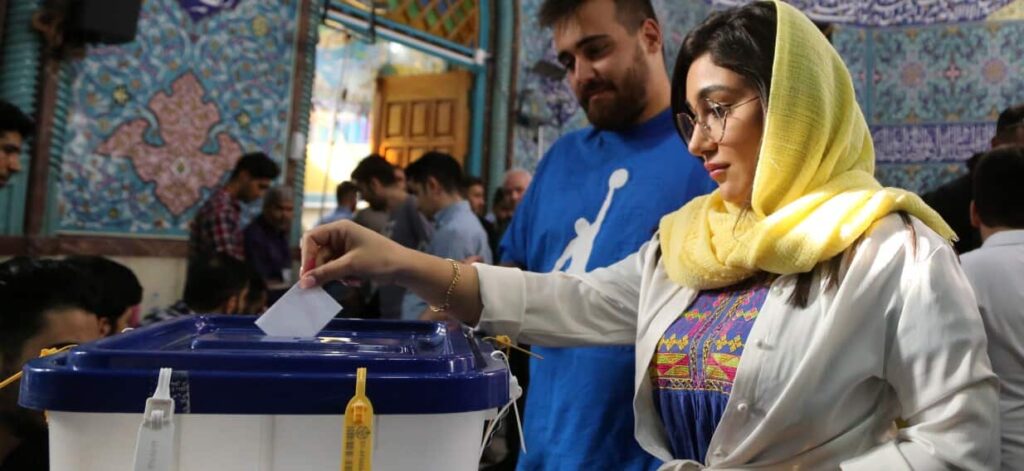Iran will hold a runoff presidential election on 5 July after neither of the top candidates secured more than 50 per cent of votes in Friday’s polls, the interior ministry said on Saturday.
The vote to replace
came down to a tight race between the sole moderate in a field of four candidates and the supreme leader’s hardline protege.
With more than 24 million votes counted, moderate lawmaker Massoud Pezeshkian led with over 10 million votes ahead of hardline diplomat Saeed Jalili with over 9.4 million votes, according to provisional results released by the ministry.
A historic low turnout
Turnout in the election was about 40 per cent, according to interior ministry data released on Saturday — the lowest on record since the 1979 revolution.
Iran’s Supreme leader, Ayatollah Ali Khamenei, had called for a high turnout after casting his vote on Friday.
Critics of Iran’s clerical rule say that low voter turnouts in recent years showed the system’s legitimacy has eroded.
Turnout was 48 per cent in the 2021 presidential election and a record low of 41 per cent of people voted in a parliamentary election in March.
In the past few weeks, Iranians have made wide use of the hashtag #ElectionCircus on X, with some activists at home and abroad calling for a boycott, saying a high turnout would only serve to legitimise the Islamic Republic.
Voters faced a choice between the three hardline candidates and the little-known reformist Pezeshkian, a heart surgeon.
Earlier vote counts had other candidates — such as hardline speaker of the parliament Mohammad Bagher Qalibaf and Shiite cleric Mostafa Pourmohammadi — well behind the two frontrunners.
As has been the case since the 1979 Islamic Revolution, women and those calling for radical change have been barred from running, while the vote itself will have no oversight from internationally recognised monitors.
While the election is unlikely to bring a major shift in the Islamic Republic’s policies since Supreme Leader Ayatollah Ali Khamenei calls the shots on top state matters, the president runs the government day-to-day and can influence the tone of Iran’s foreign and domestic policy.
The voting came as wider tensions have gripped the Middle East over the Israel-Hamas war in the Gaza Strip.
In April, Iran launched its first-ever direct attack on Israel over the war in Gaza, while militia groups armed by Tehran in the region — such as the Lebanese Hezbollah and Yemen’s Houthi rebels — are engaged in the fighting and have escalated their attacks.
Iran continues to enrich uranium at near weapons-grade levels and maintains a stockpile large enough to build — should it choose to do so — several nuclear weapons.
There had been calls for an election boycott, including from imprisoned Nobel Peace Prize laureate Narges Mohammadi.
Iran’s clerical establishment needed a high voter turnout to offset a legitimacy crisis, but activists encouraged a boycott of the elections. Source: AAP / Stringer/EPA
Mir Hossein Mousavi, one of the leaders of the 2009 Green Movement protests who remains under house arrest, also has refused to vote with his wife, his daughter said.
There’s been criticism that Pezeshkian represents just another government-approved candidate.
Iranian law requires that a winner gets more than 50 per cent of all votes cast. If that doesn’t happen, the race’s top two candidates will advance to a runoff a week later.
There’s been only one runoff presidential election in Iran’s history: in 2005, when hardliner Mahmoud Ahmadinejad bested former president Akbar Hashemi Rafsanjani.
The 63-year-old Raisi died in the May 19 helicopter crash that also killed the country’s foreign minister and others.
Masoud Pezeshkian is the sole reformist candidate in Iran’s presidential elections. Source: AAP / Majid Khahi/AP
He was seen as a protégé of Iran’s Supreme Leader Ayatollah Ali Khamenei and a potential successor.
Still, many knew him for his involvement in the mass executions that Iran conducted in 1988, and for his role in the bloody crackdowns on dissent that followed protests
, a young woman detained by police over allegedly improperly wearing the mandatory headscarf, or hijab.
Pezeshkian is faithful to Iran’s theocratic rule, but advocates detente with the West, economic reform, social liberalisation and political pluralism.
“We will respect the hijab law, but there should never be any intrusive or inhumane behaviour toward women,” Pezeshkian said after casting his vote, referring to Amini.
With reporting by Reuters.
>>> Read full article>>>
Copyright for syndicated content belongs to the linked Source : SBS – https://www.sbs.com.au/news/article/iran-goes-to-the-polls-to-vote-for-new-president-after-ebrahim-raisis-death/q0nlais41
